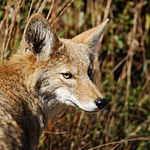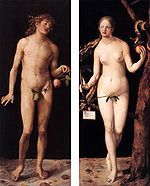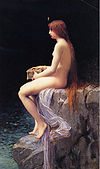- Origin of death myth
-
The origin of death is a theme in the myths of many cultures. Death is a universal feature of human life, so stories about its origin appear to be universal in human cultures.[1] As such it is a form of cosmological myth (a type of myth that explains the origins of a culture and the problems that faces it).[2] No one type of these myths is universal, but each region has its own characteristic types.[3][4] Such myths have therefore been a frequent topic of study in the field of comparative mythology.[5]
Contents
Africa
See also: African traditional religionPervasively in the myths of African cultures, in the beginning there was no death. This can be because a supreme being makes people young again when they grow old; people die but are reborn; or go to heaven to live. In some stories eternal life is lost through some flaw (such as greed, curiosity, stubbornness or arrogance), or as a punishment for disobedience, or as the result of human indifference. Other themes are the failure of a message to be delivered to humans, or a severing of the link between heaven and Earth. Sometimes it is as a result of an accident.[6]
North America
The origin of death is a common theme in Native American mythology.[7][8] The myths of the plateau tribes blame its origin on the interference of the trickster figure Coyote.[7] The Chiricahua Apache myth also blames Coyote.[9] The plains tribes ascribe it to the result of unfavorable chance. For example, in the Blackfeet account, Old Man and Old Woman arguing over whether people should die, with Old Woman using magic to ensure that the sign that they agreed upon gave her desired result.[10]
Among the native peoples of the Western United States, a common explanation of death was that it was the result of a debate between two people or animals in which one would favour death and the other immortality. For example, the story of the Thompson Indians was that Raven wanted death as there would otherwise be too many men. Coyote preferred sleep to death but was outvoted by Crow, Fly and Maggot, who sided with Raven. Raven's daughter was then the first to die and so Raven wanted to reverse his choice. But Coyote, the trickster, said that the decision was now irrevocable.[11]
Oceania
In Oceania, the most common myth is that originally people had the power to rejuvenate themselves by shedding their skin like a snake. However, when somebody, usually an old woman, does this, she frightens her grandchildren, who cry until she resumes her old skin, an act which mandates death for future generations.[3]
Polynesia
In Polynesian mythology, death is the result of the hero Māui being swallowed up by Hades or Night. If he had escaped, mankind would be immortal, however one of the birds that accompanied him burst out laughing, awakening Hine-nui-te-po who crushed Māui to death, ending hopes of immortality with him.[12]
Further information: Māui seeks immortalityWestern civilisation
In the Book of Genesis, the origin myth of Western civilisation, death is a consequence of the Fall of Man from a prior state of innocence.[1]
Greek mythology
In an early Greek myth, death is a consequence of the disagreement between Zeus and Prometheus. As a result of this quarrel, Zeus creates woman, in the form of Pandora and presents her to Prometheus' brother Epimetheus, with death being one of the results of his opening of Pandora's box, which she brought with her.[13]
See also
Notes
- ^ a b Green, James (2008). Beyond the Good Death. Philadelphia: University of Pennsylvania Press. pp. 22–23. ISBN 0812240421.
- ^ Doniger, Wendy (ed) (1999). Merriam-Webster's Encyclopedia of World Religions. Springfield: Merriam-Webster. p. 264. ISBN 0877790442.
- ^ a b Dundes, Alan (1984). Sacred Narrative, Readings in the Theory of Myth. Berkeley: University of California Press. p. 73. ISBN 0520051920.
- ^ Patton, Laurie (1996). Myth and Method. Charlottesville: University Press of Virginia. pp. 149–150. ISBN 0813916577.
- ^ See for example, Littleton, C. Scott (1973). The New Comparative Mythology. Berkeley: University of California Press. ISBN 0520024044.
- ^ Roberts, Jeremy (2010). African Mythology a to Z. City: Chelsea House Publications. pp. 33–34. ISBN 1604134151.
- ^ a b Clark, Ella (1966). Indian Legends from the Northern Rockies. Norman: University of Oklahoma Press. pp. 75–77. ISBN 0806120878.
- ^ Thompson, Stith (1977). The Folktale. Berkeley: University of California Press. ISBN 0520035372.
- ^ Opler, Morris (1994). Myths and Tales of the Chiricahua Apache Indians. Lincoln: University of Nebraska Press. p. 28. ISBN 0803286023.
- ^ Alexander, Hartley Burr (10 March 2003). North American Mythology. Kessinger Publishing, LLC. pp. 115–120. ISBN 0766133427.
- ^ Franz Boas (1917), "The Origin of Death", The Journal of American Folklore (American Folklore Society) 30 (118): 486–491, JSTOR 534498
- ^ Lang(2007) p119
- ^ Lang(2007) p116
References
- Lang, Andrew (2007). Modern mythology. Middlesex: Echo Library. ISBN 1406816728.
Further reading
- Boas, Franz (1917). "The origin of death". The Journal of American Folklore 30. http://www.archive.org/stream/journalofamefolk30ameruoft/journalofamefolk30ameruoft_djvu.txt.
- Beier, Ulli (1966). The Origin of Life and Death. London: Heinemann. ISBN 0435900234.
- Segerberg, Osborn (1976). Living with Death. New York: Dutton. ISBN 0525339450.
- Abrahamsson, Hans (1977). The Origin of Death. New York: Arno Press, 1977. ISBN 0405095511.
- Eliade, Mircea (1977). From Primitives to Zen. San Francisco: Harper & Row. ISBN 0060621346.
- Iloanusi, Obiakoizu (1984). Myths of the Creation of Man and the Origin of Death in Africa: a Study in Igbo Traditional Culture and Other African Cultures. City: Peter Lang Pub Inc. ISBN 382045408X.
- Cavendish, Richard (1994). Man, Myth and Magic. London: Marshall Cavendish. ISBN 185435731X.
- Berezkin, Yuri, 'Why Are People Mortal? World Mythology and the ‘Out-of-Africa’ Scenario' in Peregrine, Peter (2009). Ancient Human Migrations. Salt Lake City: University of Utah Press. ISBN 0874809428.
- Berezkin, Yuri, 'Thinking about death from the very beginning. African origins of some mythological motifs', in Proceedings of the International Conference on Comparative Mythology (Beijing, May 11–13, 2006), Beijing: Beijing University Press.
- Leeming, David Adams (2009). Creation Myths of the World. Santa Barbara: ABC-CLIO. ISBN 1598841742.
External links
- The Origin of Death, a chapter of Modern Mythology, by Andrew Lang
- Collections of myths
- African Stories Database
- First People — contains an alphabetized list of Native American Legends
Categories:- Mythology
- Cultural aspects of death
- Religion and death
Wikimedia Foundation. 2010.



